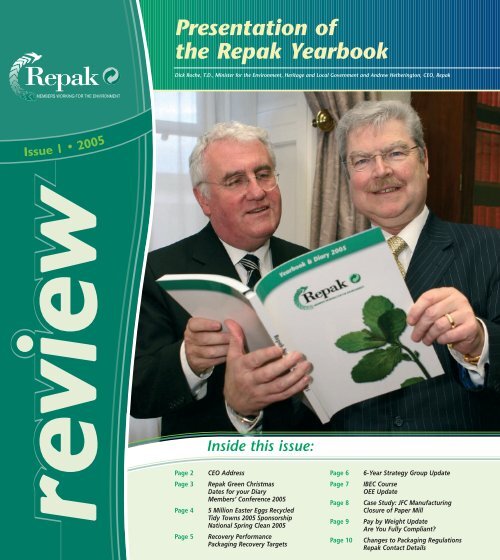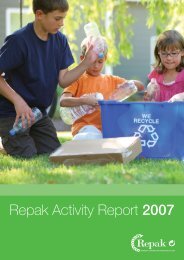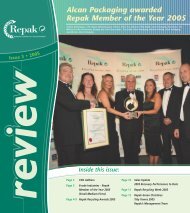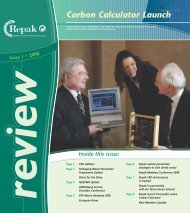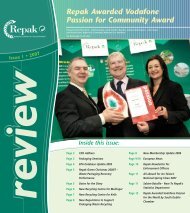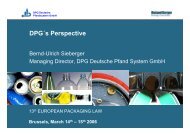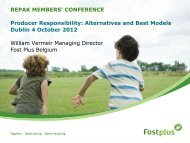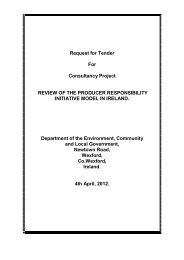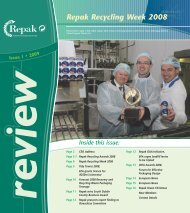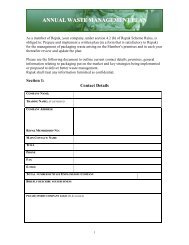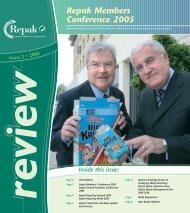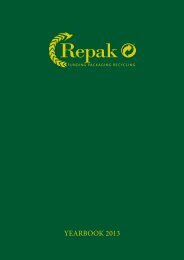Issue 1, 2005 - Repak
Issue 1, 2005 - Repak
Issue 1, 2005 - Repak
- No tags were found...
You also want an ePaper? Increase the reach of your titles
YUMPU automatically turns print PDFs into web optimized ePapers that Google loves.
Presentation ofthe <strong>Repak</strong> YearbookDick Roche, T.D., Minister for the Environment, Heritage and Local Government and Andrew Hetherington, CEO, <strong>Repak</strong><strong>Issue</strong> 1 • <strong>2005</strong>Inside this issue:Page 2CEO AddressPage 66-Year Strategy Group UpdatePage 3Page 4Page 5<strong>Repak</strong> Green ChristmasDates for your DiaryMembers’ Conference <strong>2005</strong>5 Million Easter Eggs RecycledTidy Towns <strong>2005</strong> SponsorshipNational Spring Clean <strong>2005</strong>Recovery PerformancePackaging Recovery TargetsPage 7Page 8Page 9Page 10IBEC CourseOEE UpdateCase Study: JFC ManufacturingClosure of Paper MillPay by Weight UpdateAre You Fully Compliant?Changes to Packaging Regulations<strong>Repak</strong> Contact Details
CEO ADDRESSIreland gaining respect forpackaging recycling at EUResults of <strong>Repak</strong>'s 2004 activities are very positive. They confirm another top class performance,with all targets including new membership income, recycled tonnes and cost per recycled tonnebeing achieved – and exceeded in most cases. Avril Doyle, MEP says, ‘It’s now a pleasure to be amember of the EU Environment Committee and hear such glowing reports on Ireland’s packagingrecycling performance. This is due in no small part to <strong>Repak</strong> and its members’ efforts in this regard.’A big ‘thank you’ to the membersin particular for this superb outcome,and indeed, to all of <strong>Repak</strong>’s staff andstakeholders for their part in thistremendous success.• Recycled c. 481,000 tonnes;+16% on 2003- Split: 81% commercial,19% domestic- Domestic: 92,000 tonnes;+24% on 2003- Commercial: 389,000 tonnes;+14% on 2003• Recycled c. 47% of all packaging*• Reduction of total cost per tonneby 30%• Reduction in domestic subsidyfrom €127 per tonne to anaverage of €75 per tonne(41% reduction)• Membership fees: €17.5m• New membership income €2.14m(€1.56m non-recurring); throughan additional 90 regular membersand 200 independent members• Achieved 760 new bring bank sitesco-funded by <strong>Repak</strong>/DoEHLG*Based on EPA 2003 Database and <strong>Repak</strong>estimated projections<strong>2005</strong> is a significant landmark year forIreland, and by association, for <strong>Repak</strong>,inasmuch as the 50% recyclingrequirement kicks in this year. Havingalready achieved a recycling rate ofc. 47% in 2004, I have no doubt thatthis milestone will be achieved – wehave prepared the ground well and haveworked with great determination towardsreaching the 50% mark since 2001,when the 25% barrier was cleared.I need hardly state that cost control iskey to our future. Right throughout 2004we relentlessly drove cost out of thebusiness through every means possible.Over 80% of <strong>Repak</strong>'s 2004 costs wereallocated to subsidising tonnes, bothcommercial and domestic. It’s no secretthat 48% of <strong>Repak</strong>’s recycling spend in2004 went in support of the more costlydomestic sector which yielded just 19%of total tonnes collected. It’s a factorthat <strong>Repak</strong> must carefully manage asthe share of these costly tonnes fromthe domestic bin will continue to grow,year by year.One must recognise the difficulties posedto Ireland’s contracting recyclinginfrastructure by the closure of theSmurfit paper mill in Dublin earlier thisyear. Apart from the immediate loss ofjobs, the closure further increases ourdependence on overseas markets to anunhealthy degree. This adds greatly tothe cost of verification of recycling for<strong>Repak</strong> as well as imposing high shipmentcosts to overseas markets for recoveryoperators – not the ideal situation forIreland's recycling efforts.In the current year <strong>Repak</strong> has a dynamicand challenging work programme linedup to ensure that we achieve Ireland’s50% overall packaging recovery targetwith a minimum of 15% of all materials.The programme will include:• Playing a leading role withGovernment in the 6 year StrategyGroup to develop an effective plan forthe period 2006-2011 to ensure thatIreland meets the revised recyclingtargets set for 2011 under the currentEU Directive on Packaging Waste• Undertaking a comprehensive researchstudy of members needs and attitudesto help shape the future structures ofour membership communications• Stepping up due diligence intotraceability of end recycling marketsAndrew Hetherington• Continuing toCEO, REPAKbenchmark<strong>Repak</strong> costsagainst bestpractice in otherEU compliance schemes• Vigorously seeking furtheramendments to the PackagingRegulations to bring about a moreequitable playing field, vis-à-visself-compliers• Pursuing meaningful complianceand enforcement in close co-operationwith the OEE and local authorities• Developing and implementing aplastic bottle collections strategy inconjunction with the Dublin arealocal authoritiesFor <strong>2005</strong>, I am pleased to announcean initiative to expedite communicationsbetween <strong>Repak</strong> and all stakeholders.A new single A4 news sheet, “CEO toCEO” has been produced and circulatedbi-monthly to the larger members,giving up to the minute news, views andreports on live issues and on current andplanned activities involving <strong>Repak</strong>. I hopeyou will find it both interesting andinformative.<strong>Repak</strong> Realities• The <strong>Repak</strong> model is a successfulone with a proven track recordof achievement• The challenges facing us are notinsurmountable• Opportunities are there to begrasped• We are controlling our costs• Stakeholder solidarity is key• <strong>2005</strong> landmark targets willbe achieved2
REPAK ACTIVITIES& CAMPAIGNS<strong>Repak</strong> Green ChristmasThe <strong>Repak</strong> Green Christmas campaign has beenrunning for the last three years in conjunctionwith local authorities around Ireland.In 2001, 11 local authorities participated inthe campaign. In 2004 <strong>Repak</strong> worked with31 local authorities and co-funded thepromotion of over 80 Green ChristmasRecycling Centres which were open to thepublic. Race Against Waste again agreed tosupport <strong>Repak</strong> Green Christmas by providingadditional funding to all participating localauthorities. In total over 17,297 tonnes of usedpackaging were recycled between December 2004and January <strong>2005</strong>.The overall aim of the <strong>Repak</strong> Green Christmas initiativeis to encourage householders to embrace the recyclinghabit by making it as easy as possible to recycle the30% extra cardboard, paper, glass, plastic and cansgenerated over the Christmas period. The initiativeaims to persuade people to make a firm New Year’sresolution to keep recycling.The <strong>Repak</strong> Green Christmas Campaign was supportedby a nationwide awareness programme on TV andlocal press in conjunction with local authorities.In addition there were full details of opening hoursof the Green Christmas centres and materials handledavailable on our website www.repak.ie, buildingbanners on the <strong>Repak</strong> offices and a comprehensivenational and local PR campaign.<strong>Repak</strong> members with significant staff numbersand large sites were asked to allocate an area fortemporary recycling facilities at their premises foremployee use. The aim of this was to provide aconvenient outlet for employees to recycle their excessholiday packaging, thus minimising the strain placedon recycling facilities in the local area and maximisingthe amount of used packaging collected over theChristmas period.datesfordiaryyourStatistical Training Clinics *May 19thJune 2nd, 16th & 30thJuly 14th & 28thAugust 11th & 25thSeptember 8th & 22ndOctober 6th & 20thNovember 3rd & 17thDecember 1st & 15thService Providers’ ConferenceWednesday, 25th May <strong>2005</strong>Tullamore Court Hotel<strong>Repak</strong> Members’ ConferenceThursday, 30th June <strong>2005</strong>Great Southern Hotel, DublinAirportStatistical Returns Deadline –1st half <strong>2005</strong>31st July <strong>2005</strong><strong>Repak</strong> Recycling AwardsWednesday, 5th October <strong>2005</strong>Four Seasons Hotel, Dublin<strong>Repak</strong> Recycling Week3rd - 10th October* <strong>Repak</strong> Statistical Training Clinicstake place @ the <strong>Repak</strong> offices from10am to 12.30pm approx. Pleasenote these dates are subject tochange and require advancebooking to secure a place.<strong>Repak</strong> Members’ Conference <strong>2005</strong>The <strong>2005</strong> <strong>Repak</strong> Members’ Conference will be held in the Great Southern Hotel, Dublin Airport on Thursday,30th of June and all members are welcome to attend. Further details will be provided on the content andspeakers over the coming weeks and we look forward to meeting you all there.<strong>2005</strong> is a landmark year in ensuring that the EU target of 50% of packaging is recovered/recycled. <strong>Repak</strong> areconfident that this will be achieved. In meeting Ireland’s targets, <strong>Repak</strong>’s 2,000 members should be proud oftheir achievements.3
‘Eggsactly’ what Ireland needs- 5 Million Easter Eggs RecycledREPAK ACTIVITIES& CAMPAIGNS• Irish households eat over 1 million kgof chocolate over the Easter period• 375,000 kg of used Easter eggpackaging was generatedThis year over 5 million Easter eggs werebought as presents while Easter festivitiessaw 15 million beverage cans and1 million bottles of wine consumed.<strong>Repak</strong> carried out research in Marchamongst 1,200 Irish adults in advanceof the launch of the <strong>Repak</strong> Easterpackaging recycling campaign whichrevealed the following purchasingpatterns amongst Irish consumers:• 7 out of 10 people viewed Eastereggs as the most popular Easter gift• Just over half of all Easter eggs arebought for children or teenagersunder 18 years of age, a third arebought for adults and 17% buy Eastereggs for themselves.• According to 6 out of 10 people,chocolate quantity is the number onefactor that determines choice of Eastereggs, while 1 in 3 opt forpresentation.• The packaging element most likely tobe recycled is the cardboard (7 in 10),followed by plastic (almost 1 in 2) andfoil (about a quarter).According to Darrell Crowe, MarketingManager, <strong>Repak</strong>, “Easter is a special timeof celebration and gift giving, but as aresult a lot of additional used packagingis generated. Our research showed thatthree quarters of those who give Eastereggs claim they recycle some part oftheir packaging. We are calling oneveryone to make aspecial effort this Easterto recycle as much usedpackaging as possibleeither throughhousehold dry recyclablecollection bins, bringbanks or at the nearestbring centre or civicamenity site.”<strong>Repak</strong> issued a pressrelease prior to Easterdetailing the above researchresults urging all households to preventvaluable materials ending up in landfilland to recycle as much used packagingas possible. The release featured in thefollowing: The Irish Times, The Examiner,The Star, The Sun, The Mirror andMorning Ireland.<strong>Repak</strong>’s <strong>2005</strong> Sponsorship of Tidy TownsThe Tidy Towns competition has been running in Ireland for over 50 years andeach year attracts more than 700 local communities who compete for a cashaward and the title of "Ireland's Tidiest Town".This year <strong>Repak</strong> are delighted to be sponsoring a new category called ‘Best Presented Bring Bank’ in which there will be sevenregional winners and one overall winner. In addition, on behalf of its members, <strong>Repak</strong> will continue to sponsor the sevenoverall regional Tidy Towns awards.It has been 10 years since the competition was taken over by the Department of the Environment, Heritage & LocalGovernment and to mark this special anniversary, the total prize money has increased by almost 20% to over €180,000– the largest prize fund ever.National Spring Clean <strong>2005</strong>National Spring Clean is Ireland’s largest anti-litter initiative.Supported by An Taisce and funded by the Department of theEnvironment, Heritage & Local Government, <strong>Repak</strong>, on behalfof its members, are proud sponsors of the campaign. <strong>2005</strong>looks set to break all past records with over 1,000 groupsalready registered to participate in this year's campaign.All groups participating in National Spring Clean are issuedwith a free clean up kit which contains information andmaterials that are helpful when organising a clean up.Included in the kit are colour-coded refuse sacks providedby <strong>Repak</strong> for collecting recyclables such as cans and plasticbottles. Last year due to the colour-coded bags suppliedby <strong>Repak</strong>, over 23% of the material collected was recycled.Gary Miller, The Wrigley Company; Batt O’Keeffe, T.D. Minister of State at theDepartment of the Environment, Heritage and Local Government; Patricia Oliver,Chairperson of NSC; Mo Durkan, Coca-Cola Bottlers Ireland; Belinda Byrne, <strong>Repak</strong>4
2004 Recovery PerformanceREPAK TARGETSTable 1 below displays the used packaging recovery performance to date in terms of tonnes per material type. This materialis collected from two source sectors; industry's back door and the domestic waste stream (bring and household kerbsidecollection networks).Table 1: 2004 Waste Packaging Recovery and Recycling PerformanceWaste Packaging 2004 Est. Waste 15% Min. Recovery RPS tonnes % RecoveryMaterial Type Arising Tonnes Guideline recovered /Material 3adjusted for contam 1 Target/material 2Paper & cardboard 483,211 74,995 200,523 42Glass 139,226 20,961 87,717 63Plastic 186,468 33,286 39,000 21Metals 92,561 14,818 45,653 49Wood/Textiles 112,114 16,817 106,019 95Total 1,013,579 478,912 4712004 Waste packaging arising based on the EPA published 2003 NWDR extrapolated forpopulation growth per 2002 CSO data.2The figures in column 2 are only guideline targets at this stage. They are not mandatoryuntil 31st December <strong>2005</strong>.3The final recovery figure is a forecast figure as the EPA are due to report the 2004 wastearising figures by December <strong>2005</strong>.The 2004 used packaging recovery figures continue to show improvement.Recovery for recycling from industry’s back door has seen a 15% increase over2003 figures and used household packaging has increased by 24%.Continued support and funding by <strong>Repak</strong>, together with recent governmentlegislative and enforcement improvements will see the achievement of the<strong>2005</strong> landmark packaging waste recovery and recycling targets.<strong>2005</strong> Packaging Recovery TargetsTable 2 below display the <strong>Repak</strong> recovery targets for used packaging in <strong>2005</strong>.Table 2: <strong>2005</strong> <strong>Repak</strong> Recovery Targets of Used PackagingMaterial Back Door Household Material TargetsPaper+cardboard 202,000 44,925 246,925Glass 40,000 54,375 94,375Plastic 32,000 6,000 38,000Metals 39,400 5,700 45,100Wood/Textiles 110,600 0 110,600Total(s) 424,000 111,000 535,000The amount of used packaging that needsto be recovered to satisfy the national50% recovery target is undetermined bythe EPA at this time. The EPA publishes theNational Waste Database Report everythree years. Interim reports are publishedafter the first 18 months. <strong>Repak</strong> estimatesthat approx. 535,000 tonnes of usedpackaging need to be recovered tocontribute towards the achievement ofthe 50% recovery target. Additionalcontributions of tonnage recovery willcome from the increasing number ofself-compliers who report to localauthorities. <strong>Repak</strong> are confident thatthe <strong>2005</strong> national recovery targets willbe satisfied.5
REPAK TARGETS6-Year Strategy Group UpdateThe NSGPWR (National Strategy Group on PackagingWaste Recycling) had its first meeting in October 2004with a mandate to develop an effective programme forthe period 2006-2011 to ensure that Ireland will meetthe revised recycling targets set for 2011 under the currentEU Directive on Packaging Waste.The strategy group is co-chaired by Adrian Goodrich,Chairman of <strong>Repak</strong> and Tom O’Mahoney, AssistantSecretary of the Department of the Environment,Heritage and Local Government. Representatives fromboth industry and the public sector are members of theNSGPWR and the model is based on partnership with allkey stakeholders working together to ensure that Ireland’sobjectives are achieved. This replicates the model whichhas worked successfully with the current Five Year StrategyGroup (2001-<strong>2005</strong>), with Ireland currently positioned tomeet its targets for <strong>2005</strong>.The initial task undertaken by the NSGPWR was to reviewand amend the Packaging Regulations. It was decided todo this review in two phases. The first phase focused ona number of key areas which needed to be tightened up.This phase was completed on 30th December 2004,with the Minister for the Environment, Heritage and LocalGovernment signing off on a number of amendments tothe regulations. Phase two of the review process involvesa comprehensive policy review of a number of areas;self-compliance registration fees and arrangementsrelating to the purchase of packaging waste by selfcompliers. This review is ongoing and it was the mainitem on the agenda of the NSGPWR when they held theirfirst meeting of <strong>2005</strong> on Wednesday 9th of March. It wasa lively debate with strong views being expressed on allsides. Steady progress was made but there are still somedifficult issues to be resolved. On a positive note however,all participants are of the view that it is essential that atthe end of the current review process we will have robustregulations which will ensure a level playing field for all.At their recent meeting, the NSGPWR also outlined aprogramme of work and a timeframe to develop and signoff the strategy before year end. It is envisaged that thenew strategy for 2006-2011 will be launched by theMinister for the Environment, Heritage and LocalGovernment in December <strong>2005</strong>.REPRESENTATIVEJohn O’LoughlinEugene HearyDavid RamsayTony KeohaneJohn CurranKieran MullinsNSGPWR Industry RepresentativesORGANISATIONSmurfit Corrugated IrelandBatchelors LimitedC&C IrelandTesco IrelandMusgrave GroupOnyx Ireland Limited6
IBEC Waste Prevention and Minimisation courseMEMBERS UPDATEThis new developmentin assisting Irishindustry to helpidentify methodsof improvingenvironmentalperformance is asymptom of the issuesfacing companiestoday.Topical and current issues such asobtaining outlets for waste; risingcosts; increasing legislative burdensand tightening limits on water andair emissions; growing customerdemands for minimum productconsequences are exercising theminds of Irish business andenvironmental professionals.Lack of formal knowledge andtechnical skills in this regard arekey barriers to waste prevention andminimisation. IBEC, in conjunctionwith the EPA and the CleanTechnology Centre (CTC) havedeveloped a new certifiedprogramme to address this need.This programme is primarily aimedat individuals, at either a technical orsupervisory level, charged with wasteprevention or minimisation strategieswithin their own organisation or forclients. A certain level of relevantexperience or technical knowledgeof waste management issues willbe required.This certified course will provideparticipants with an opportunityto network with other companieson waste prevention issues and theability to identify and quantify thecauses and effects of wastegeneration from their processes,products and services throughouttheir life cycle.The course is run over aneight-month period from April toNovember <strong>2005</strong>. The programmewill be delivered through seven daysof face to face tuition, 60 hours ofdirected self-study and a workplacebased project with two associatedtutorial days. Following successfulcompletion of the course, participantswill be provided with certification byCork Institute of Technology.For further enquiries contact:Catherine Dolan or Erik O'Donovanin IBEC (Tel: 01-6051605,Fax: 01-6381605 or e-mail:catherine.dolan@ibec.ie/erik.o'donovan@ibec.ieOEE UpdateLate in 2004, responsibility for the administration of the Local Authority Enforcement Network was transferred from theDOEHLG to the Office of Environmental Enforcement (OEE); the new dedicated body established within the EPA to monitorthe implementation and enforcement of environmental legislation in Ireland. In effect, the OEE now oversees enforcementof the Packaging Regulations, via the local authorities.One of the first tasks undertaken by the OEE was the establishment of a Packaging Waste Working Group charged withdrawing up a protocol to guide local authorities in the enforcement of the Packaging Regulations. This body comprisedrepresentatives from the OEE, local authorities and <strong>Repak</strong>, and completed work on drawing up the protocol in November2004 after a series of preparatory meetings.Regular meetings of the Local Authority Enforcement Network are now held under the chairmanship of Andy Fanningof the OEE. At these meetings, enforcement officers drawn from the 34 local authorities report on progress against listsof prospective, obligated non-compliers based on intelligence gathered from a variety of sources.To date, good progress has been made by the network in identifying major producers who are operating outside thelaw and <strong>Repak</strong> will continue to press for more action in this area. Most of these non-compliers are now getting the clearmessage from the Enforcement Network - to simply do nothing is no longer an option. To judge from the volume ofmembership enquiries flowing into <strong>Repak</strong>, this new strategy by the statutory enforcement authorities is moving in theright direction.7
MEMBERS UPDATECase Study : JFC Manufacturing Co.JFC Manufacturing Co. hasbeen manufacturing qualityplastic products at theirplant in Tuam, Co. Galwaysince 1987.Through its plants in Tuamand Stratford-upon-Avon andtheir plastic recycling plant in St.Helens, Merseyside, JFC has closedthe loop on recycling plastic bottles.JFC recycle the plastic HDPE bottlesused to manufacture JFCCorriPipe, which is madefrom 100% post-consumerrecycled plastic. They evenmake bottle banks in whichto collect the bottles!The JFC CorriPipe is atwin wall high densitypolyethylene (HDPE)drainage pipemanufactured by a twinextrusion process. Twohigh-density polyethylenepipes are extrudedsimultaneously, one insidethe other and heat-welded togetherin one continuous process. The outerwall is corrugated while the inner wallis smooth finished. It is a combinationof the corrugations and the heatwelding of the two walls that giveCorriPipe its unique strength necessaryin a lightweight pipe which can beinstalled up to 10 metres deep whileits smother inner wall ensuresincreased flow capacity. It benefits theenvironment both in its productionand installation.JFC is providing a guaranteedsustainable end market for collectedwaste plastic bottles in the productionof JFC CorriPipe. With backing fromEnterprise Ireland, an investmentof €2.5 million will be made in aresearch and development unit andin the expansion of the productionof the CorriPipe at its Tuam plant.The lifecycle of a plastic bottlecontinues once it’s deposited in abottle bank. Its journey then takesit to the JFC state-of-the-art recyclingplant at St. Helens. Several Irish firmswere involved in collecting the 5,000tonnes of plastic bottles recovered lastyear and are selling them on to JFC.Once bottles are debaled and washed,they are further sorted into twoindependent process lines, one forrecovering polyethylene terephthalate(PET) and another for HDPE. Thebottles are then processed intogranules. They are broken down intotwo forms – HDPE pellets and PETflake. The flake goes onto garmentmanufacturers while the pellets goto the Tuam and Stratford plants tomanufacture JFC CorriPipe.JFC CorriPipe have been used inmajor road construction schemes suchas the N52 Mullingar Bypass, N18Ennis Bypass, the M1 Dundalk WesternBypass, N4 Sligo Inner Relief Road andN15 Ballyshannon/Bundoran Bypass aswell as being used by various countycouncils.This year 10,000 tonnes of plasticbottles will be processed by JFC,rising to 20,000 tonnes by 2008.The demand for JFC CorriPipe isgrowing and subsequently the needfor plastic bottles to feed the pipemachines is currently in excess of500,000 bottles per day. In the futureJFC will be actively seeking to sourceIrish recycled plastic bottles for themanufacture of CorriPipe. JFC are wellpositioned to help the environment ina very positive way while creatingemployment and an excellent endproduct.Closure of Paper MillJefferson Smurfit Group recently announced the closure ofthe Smurfit Paper Mill in Dublin, with the loss of 58 fulltimeand 12 part-time jobs. The mill has been in operationfor 51 years.The decision follows a detailed review of the mill's operation,which has become uncompetitive due to a number of keyfactors, including reduced market pricing, increased energycosts, higher environmental charges and changing marketrequirements for packaging paper grades.The closure of the Smurfit Paper Mill in Dublin is asignificant blow for recycling in Ireland, according to <strong>Repak</strong>.The closure further erodes Ireland's ability to recycle usedpackaging and removes the capacity to recycle 40,000tonnes of paper and cardboard. This equates toapproximately 10% of all used packaging collected forrecycling or c.20% of the 176,000 tonnes cardboard/paperpackaging in Ireland in 2003, which will now have to beexported for recycling.According to Andrew Hetherington, CEO, <strong>Repak</strong>, “Thisannouncement further increases our reliance on overseasmarkets, which diminishes our control and increases thecomplexity and costs of recycling. The combined closureof Irish Glass and Smurfit’s reduces our indigenous recyclingcapacity by approximately 90,000 tonnes per annum.However, Ireland is still well positioned to meet our nextround of EU packaging recycling targets and althoughwe have few indigenous recyclers left, the collection andprocessing function continues to grow in strength. Thereality is that cardboard and paper collected will continueto be recycled but now unfortunately, recycled abroad.”8
Pay by Weight - UpdateMEMBERS UPDATEIrelands municipal wastemanagement is undergoingfundamental change, moving quicklyfrom a primitive one-dimensionalapproach historically dependant onlandfill towards ever improvingachievements in recycling, recovery,minimisation and prevention.There are many factors driving thischange as outlined in the previousnewsletter. To remind you theseinclude:• Growing levels of municipal wastebeing produced (up 233% from1986-2003 levels)• High dependency on landfill• Landfill capacity is diminishingrapidly• Increased cost of landfill disposal(c. €100-€200/tonne)• Low recycling rates (13% - 2003NWDR figures)As from 1st January this year Pay byWeight systems for household wastehave been introduced nationwide.This means that in some parts ofIreland, householders now pay anannual service charge of up to€140 per annum for the provision ofcollections services for their residualwaste. In addition they must pay€0.33/kg for the residual waste theydeposit in their bins.A critical element of the acceptanceand use of the system is theengagement and support of thehouseholder. Pay by Weight systemsplace greater emphasis on wasteeducation showing increased recyclingrates and providing strong financialincentives to recycle. Recyclingawareness information programmessuch as <strong>Repak</strong> National RecyclingWeek, <strong>Repak</strong> Green Christmas, theongoing government Race AgainstWaste campaign and <strong>Repak</strong>’s supportof the local authority EnvironmentalAwareness Officer network will allassist in the enlightenment the public.It is too early to evaluate thesuccess or otherwise ofthe Pay by Weight (PBW)system. However, researchreveals that in West Corkwhen PBW was initiallytrialled, a reduction of 43%in the amount of waste sentto landfill occurred between2002 and 2004. The amountof waste produced per householddropped from 1,300kg in 2002 to850kg in 2003. It decreased evenfurther then to 740kg in 2004.Presently Ireland's average wasteper household is 1,240kg – asignificant challenge lies ahead toreach the levels attained in West Cork.An even greater challenge would beto match the 442kg that Swedishhouseholds produce per annum.Are you confident you are fully compliant with Waste Management legislation?During the last number of months, <strong>Repak</strong> have noticedincreased enforcement activity from local authorities inrelation to legal obligations facing industry under the WasteManagement legislation. Such increased activity has been verywelcome particularly in identifying obligated major producerswho are non-compliant with the Packaging Regulations andwho are neither <strong>Repak</strong> registered nor self-compliant.In conjunction with this, there have been increased levelsof spot checks of <strong>Repak</strong> members to ensure that:• The correct signage is on display (note the new changeto the amended regulations requiring all major producersto display the A3 notice at or near the public accessentrance)• All business units are being declared under existing <strong>Repak</strong>membership and have the appropriate signage on display• The specified materials under the Packaging Regulationsare being adequately segregated and made available forrecycling• No illegal burning is taking place on the premises<strong>Repak</strong> would urge all its members to take stock of the aboverequirements and ensure that none of them are overlookedin order to avoid potential prosecutions by your localauthority. In particular, large companies who have manysubsidiaries are asked to ensure that each of them iscorrectly registered with <strong>Repak</strong> and is being reported forcorrectly through the packaging data returns. Remember,if your subsidiary company is not registered with <strong>Repak</strong>,it is not covered legally under your membership.If you have not completed and returned your Annual WasteManagement Plan, please do so now as a lot of the aboveitems are contained in the plan and will help focus yourattention to ensure nothing is being overlooked.Should you have any doubts over your obligations relatingto the above, please contact Tony or Liam in MembershipServices to seek clarification. (Tel: 01-4670190 or e-mail:tony.obrien@repak.ie / liam.moloney@repak.ie)9
NEWSChanges to the Packaging RegulationsOn December 23rd 2004 Dick Roche, TD,Minister for the Environment, Heritage and LocalGovernment signed new Packaging Regulationsto commence with effect on December 30th2004.The new regulations make a number of changesto the existing 2003 Packaging Regulations,under which ‘major producers’ of packagingwaste are required to take steps individuallyto collect and recover packaging waste(i.e. self-comply) or alternatively, gain exemptionfrom those and other prescribed obligations bycontributing to and participating in a packagingwaste compliance scheme approved by theMinister.The main change in the new regulations is anincrease in the registration fees payable by selfcomplying‘major producers’ to local authorities.The previous maximum fee of €5,000 perpremises from which packaging or packagingproducts are supplied has now been raised to€15,000 per premises.The fee revision should be regarded as aninterim arrangement pending the completionof a comprehensive policy review of the selfcompliancefee structure which will includeexamining the ‘purchase’ of packaging wastefor the purpose of fulfilling certain of the selfcomplianceobligations under the regulations.It is expected that the new regulations will beready for signing in late summer/early autumn.As concluded in the Minister's press release onsigning the new regulations, “<strong>Repak</strong> membershave been faced with significantly increasedmembership fees in the last two years. In orderto ensure a more level playing field, it is only fairthat those ‘major producers’ not participatingin the <strong>Repak</strong> scheme should also be faced withincreased compliance costs under the PackagingRegulations”.In addition, the new regulations requireself-compliers to place notices in localnewspapers in March and September advertisingtheir take-back facilities and their obligation totake back from members of the public. Tosupplement this new provision local authoritiesare also required to take out an advertisementat least once a year.Minister Roche said that his Department will becarrying out a comprehensive policy review inrelation to the self-compliance registration fees.The review will also include consideration of allaspects of the arrangements relating to the‘purchase’ of packaging waste for the purposeof fulfilling certain of the self-complianceobligations under the regulations. It is expectedthat the new regulations will be ready forsigning in late summer/early autumn.<strong>Repak</strong> Ltd.Red Cow Interchange Estate1 Ballymount RoadClondalkinDublin 22.Tel: 01 467 0190Fax: 01 403 0929E-mail: info@repak.ieWebsite: www.repak.ieCONTACT DETAILS FOR REPAK’S MANAGEMENT TEAMMembership Services Team:Fax 01-4670196Tony O’Brientony.obrien@repak.ieLiam Moloneyliam.moloney@repak.ieKathleen O’Donoghue-Ryankathleen.odonoghue@repak.ieHelen Searsonhelen.searson@repak.ieTelephone for all:01-467 0190Statistics Team:Fax 01-4030929Arthur O’Connorarthur.oconnor@repak.ieCarmel Carrollcarmel.carroll@repak.ieBrenda Keoghbrenda.keogh@repak.ieSandra Whelansandra.whelan@repak.ie10Sales :Fax 01-4670196Elizabeth Barryelizabeth.barry@repak.ieIan Blackian.black@repak.ieNuala Tierney (CEO Office)nuala.tierney@repak.ie Fax 01-4670197Collections/Local AuthorityTeam:Fax 01-4030929Bill Dolanbill.dolan@repak.ieMichael Hehirmichael.hehir@repak.ieDenis Fitzpatrickdenis.fitzpatrick@repak.ieUna O’Callaghanuna.ocallaghan@repak.iePRINTED ON RECYCLED PAPER Loman Cusack Design, Dublin


